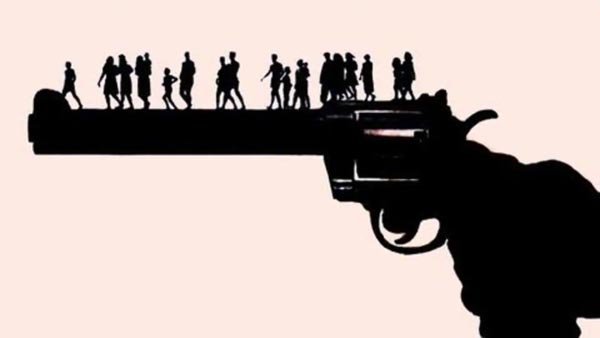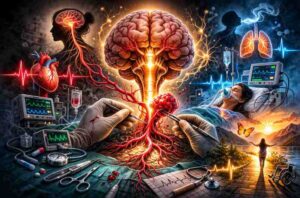The recent killing of health staff in the US is a reminder of what is at stake for doctors for whom workplace violence has become an occupational hazard

“US man blames surgeon for back pain after spine surgery, kills him and three others,” screamed the headline flashing around in the news recently. A patient armed with a gun had shot his doctor at a hospital in Oklahoma in one of the most developed countries of the world, destroying lives that were full of promise. He was allegedly unhappy with unremitting pain following surgery that had been performed only a few weeks prior. He had bought a rifle hours before the rampage of his despicable act and killed the surgeon, his colleague, the receptionist, and a bystander who took a bullet for his wife, robbing four lives of the gift of life.
Many people have asked me why I returned from the United States after having trained there for a couple of years, and I think I finally have an answer. More than two-thirds of pain specialists surveyed during a violence education session at a 2019 American Academy of Pain Medicine meeting said a patient has threatened them with bodily harm at least once a year. Nearly half said they had been threatened over opioid management.
“If guns were legal in India, we would all be dead by now,” a doctor I know commented when the headlines made our way through WhatsApp circles. Indian doctors have been no strangers to violence either. Over the years, the news has been fraught with reports of brutality against people of the fraternity, but like all scoops, it remains an issue only until something more sensational comes up.
An article published in a psychiatry journal states that ‘the Indian Medical Association suggests that up to 75% of doctors have faced some kind of violence at work, which is similar to the rates from some other countries on the continent.’ This violence may comprise telephonic threats, intimidation, verbal abuse, physical but non-injurious assault, physical assault causing simple or grievous injury, murder, vandalism, and arson. ‘Medical professionals who faced violence have been known to develop psychological issues such as depression, insomnia, post-traumatic stress, fear, and anxiety, leading to absenteeism,’ quotes the British Journal of General Practice in a 1994 article – almost three decades ago!
When I trained as a resident doctor, I once walked into the room to complete the paperwork on an elderly gentleman who had passed from a complication not directly linked to surgery. His weeping son held me aggressively by the collar and shook me until my teeth rattled. “You people have killed my father!” he shrieked, in a voice I can still hear echoing through his bloodshot eyes till date. I was momentarily stunned but quickly realised where this uncontrolled hysterical outburst stemmed from.
I remember not long ago when the clergy of a religious sect was brought into the emergency department at another hospital with a flat line on the ECG. The staff did everything they could to resuscitate him, but his heart attack was massive. His followers broke down the ER, destroyed the glass panes, and damaged monitors, causing a colossal loss to the hospital’s overall infrastructure. We’ve all seen CCTV footage of patients’ relatives cornering and lambasting resident doctors in government hospitals. A statement from the popular American journal JAMA written 130 years ago, in 1892, rings true even today: ‘No physician, however conscientious or careful, can tell what day or hour he may not be the object of some undeserved attack, malicious accusation, black mail or suit for damages’.
Illness, when faced by us or inflicted upon loved ones, conjures up a plethora of emotions. All of us at some point in our lives have cursed a doctor. Within two consecutive days, feelings towards a doctor can change from intense affection to extreme anger. Sometimes you can hear it in their voice, sometimes in their eyes. Of course, patients and families have a right to be angry when things don’t go well. As physicians and surgeons, we understand that. We acknowledge that when patients don’t get better, there is anguish and distress. I’ve also realised that often, good communication alleviates most concerns even though uncertainty may linger. Violence stems from ignorance and hatred, when, instead, we should strive for learning and reason, the much-needed antidote for impulsive behaviour.
I’ve had patients who’ve been unhappy with my treatment. I’ve had outcomes that have been less than satisfactory (to put it mildly). However, I have always endeavoured to seek a solution that gets my patients to be better than what they were before they came to me. If their issue falls beyond my core expertise, I send them to the right specialist, and if it’s a complication of a previous surgery, I seek a second opinion. It is imperative for a doctor to go beyond their call of duty to attempt to alleviate suffering by being true to themselves and their patients. Most doctors do that, and most patients can see it.
Pain is multifactorial and remains a complex problem to treat. If the primary problem is not adequately addressed, long-standing pain gets wired into the brain. Neuroscientists are now determining networks that could modulate those circuits through transcranial magnetic stimulation and relieve pain. Soon, we might be able to use this technology to change the minds of those who want to shoot us.
Egaz Moniz, a neurologist of the 20th century who won the Nobel prize for psychosurgery in 1949, pioneered the now obsolete procedure of the frontal lobotomy for curing mental illness. His belief was that surgically removing white matter fibres from the frontal lobe would improve a patient’s anxiety and depression. He was shot multiple times by a patient with schizophrenia and lived the last 15 odd years of his life in a wheelchair, until he died from an internal haemorrhage in 1955.
“Love is the only way to rescue humanity of its ills,’ Leo Tolstoy, one of the most prolific writers of his time, wrote in a letter to Mahatma Gandhi, affirming his advocacy of non-violence. Violence in any form, in any field, should be admonished. It is simply not how a civilized society can make any progress. As legendary composer Leonard Bernstein said, when he addressed the country’s most distinguished artists, writers, and other public figures a few days after JFK was assassinated, “This must be the mission of every man of goodwill: to insist, unflaggingly, at risk of becoming a repetitive bore, but to insist on the achievement of a world in which the mind will have triumphed over violence.”




0 thoughts on “The surgical shooting”
To be an accomplished doctor is a gift and to serve humanity with holistic mindset is a rare gift.
Your columns helps us to understand a doctor ‘s perspective.
If only people can think of a doctor as a human being with limitations and not God and accept the inevitable and make peace with it.
The decision to surrender ourselves or a family member at the hands of a doctor should be well informed.